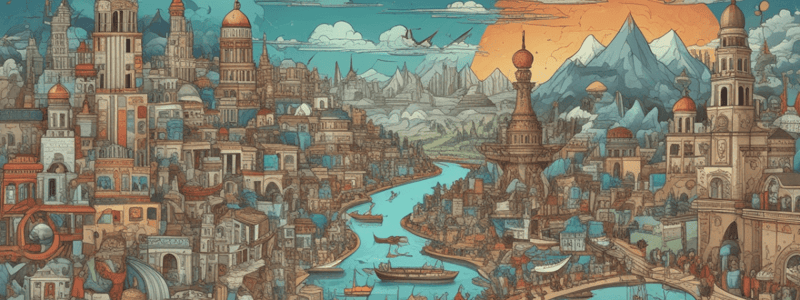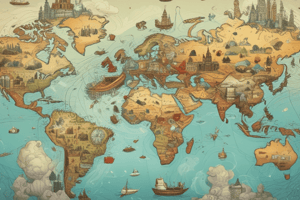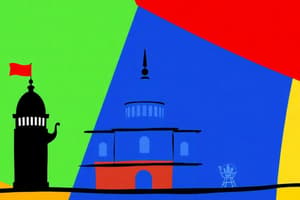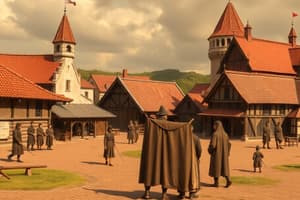Podcast
Questions and Answers
In an _______________ monarchy, all power lies in one person, often the king or queen.
In an _______________ monarchy, all power lies in one person, often the king or queen.
absolute
A ___________________ is a middle class person.
A ___________________ is a middle class person.
bourgeoisie
The ___________________ of a country refers to loyalty and attachment to it.
The ___________________ of a country refers to loyalty and attachment to it.
nationalism
The rate of increase in prices over a given period of time is called ___________________
The rate of increase in prices over a given period of time is called ___________________
The Tennis Court Oath started on ___________________ 20, 1789, at the palace of Versailles.
The Tennis Court Oath started on ___________________ 20, 1789, at the palace of Versailles.
The process of beginning to use machines and technology to do work is called ___________________.
The process of beginning to use machines and technology to do work is called ___________________.
The practice of growing crops or raising animals is called ___________________.
The practice of growing crops or raising animals is called ___________________.
The intent to destroy a national or religious group is called ___________________.
The intent to destroy a national or religious group is called ___________________.
The increase in population of people living in towns and cities is called ___________________.
The increase in population of people living in towns and cities is called ___________________.
Making all the decisions for the people you govern is called ___________________.
Making all the decisions for the people you govern is called ___________________.
The Indian Act classified Indians into ______ and Status Indians.
The Indian Act classified Indians into ______ and Status Indians.
The ______ of the Indian Act was to control and assimilate Aboriginal people.
The ______ of the Indian Act was to control and assimilate Aboriginal people.
The Indian Act was imposed on Aboriginals by the ______.
The Indian Act was imposed on Aboriginals by the ______.
The 1969 White Paper aimed to ______ the Indian status and treaties.
The 1969 White Paper aimed to ______ the Indian status and treaties.
The Canadian government established a system of ______ schooling through the Indian Act.
The Canadian government established a system of ______ schooling through the Indian Act.
The Indian Act used residential schools to ______ culture and community.
The Indian Act used residential schools to ______ culture and community.
The residential schools were characterized by ______ and abuse of Indigenous children.
The residential schools were characterized by ______ and abuse of Indigenous children.
The Indian Act controlled ______ by prohibiting Indigenous students from speaking their own language.
The Indian Act controlled ______ by prohibiting Indigenous students from speaking their own language.
The Indian Act prevented Indigenous students from ______ their cultural traditions or activities.
The Indian Act prevented Indigenous students from ______ their cultural traditions or activities.
The Indian Act separated Indigenous children from their ______ by taking them away from their homes.
The Indian Act separated Indigenous children from their ______ by taking them away from their homes.
In an ___________________ monarchy, all power lies in one person, often the king or queen.
In an ___________________ monarchy, all power lies in one person, often the king or queen.
The ___________________ of a country refers to loyalty and attachment to it.
The ___________________ of a country refers to loyalty and attachment to it.
The rate of increase in prices over a given period of time is called ___________________.
The rate of increase in prices over a given period of time is called ___________________.
The process of beginning to use machines and technology to do work is called ___________________.
The process of beginning to use machines and technology to do work is called ___________________.
The practice of growing crops or raising animals is called ___________________.
The practice of growing crops or raising animals is called ___________________.
The intent to destroy a national or religious group is called ___________________.
The intent to destroy a national or religious group is called ___________________.
The increase in population of people living in towns and cities is called ___________________.
The increase in population of people living in towns and cities is called ___________________.
Making all the decisions for the people you govern is called ___________________.
Making all the decisions for the people you govern is called ___________________.
The Indian Act classified Indians into Non-Status and ______ Indians.
The Indian Act classified Indians into Non-Status and ______ Indians.
The goal of the Indian Act was to achieve ______ and assimilation of Aboriginal people.
The goal of the Indian Act was to achieve ______ and assimilation of Aboriginal people.
The Indian Act was a ______ piece of legislation imposed on Aboriginals by the government.
The Indian Act was a ______ piece of legislation imposed on Aboriginals by the government.
The 1969 White Paper aimed to ______ the Indian status and treaties.
The 1969 White Paper aimed to ______ the Indian status and treaties.
The Indian Act controlled education by prohibiting Indigenous students from speaking their ______ language.
The Indian Act controlled education by prohibiting Indigenous students from speaking their ______ language.
The Indian Act prevented Indigenous students from practicing their ______ traditions or activities.
The Indian Act prevented Indigenous students from practicing their ______ traditions or activities.
Residential schools were established in _______________, with the goal of assimilating Indigenous children into European-Canadian culture.
Residential schools were established in _______________, with the goal of assimilating Indigenous children into European-Canadian culture.
In residential schools, children were punished for speaking their _______________ languages or practicing their cultural traditions.
In residential schools, children were punished for speaking their _______________ languages or practicing their cultural traditions.
Under the Indian Act, Indigenous peoples are categorized as either 'Status Indians' or '_______________ Indians'.
Under the Indian Act, Indigenous peoples are categorized as either 'Status Indians' or '_______________ Indians'.
To be considered a Status Indian, one must meet certain _______________ requirements (at least 1/4 Indigenous ancestry).
To be considered a Status Indian, one must meet certain _______________ requirements (at least 1/4 Indigenous ancestry).
Flashcards are hidden until you start studying
Study Notes
Systems of Government and Society
- Absolute Monarchy: a government where all power lies in one person, often the king or queen.
- Feudalism: a medieval model of government before the birth of the modern nation-state.
Important Events and Groups
- Tennis Court Oath: an oath taken on June 20, 1789, at the Palace of Versailles, marking the beginning of the French Revolution.
- National Assembly: a group that played a key role in the French Revolution.
- Declaration of the Rights of Man and Citizen: a document adopted in 1789, stating the fundamental principles of the French Revolution.
- Reign of Terror: a period of violence during the French Revolution, marked by the establishment of the Committee of Public Safety.
Economic Systems and Concepts
- Capitalism: an economic system.
- Socialism: a way to organize a society.
- Mechanization: the process of beginning to use machines and technology to do work.
- Urbanization: the increase in population of people living in towns and cities.
- Agriculture: the practice of growing crops or raising animals.
- Inflation: the rate of increase in prices over a given period of time.
- Deficit: a deficiency in amount or price.
Industrial Revolution
- First Industrial Revolution in Britain: started in the late 18th and 19th centuries, marked by mechanization, including the invention of the Spinning Jenny.
- Spinning Jenny: a machine used for spinning wool or cotton.
- Steam Engine: a machine using steam power to perform mechanical work through heat.
- Changes to Transportation: the use of steam engines led to the development of locomotives and steam boats, revolutionizing transportation.
Social and Political Concepts
- Assimilate: the process of becoming similar to others.
- Paternalism: making all the decisions for the people you govern.
- Colonialism: control by one power over another.
- Cultural Genocide: the intent to destroy a national or religious group.
- Reserves: held back for future use.
The Indian Act
- Classifications: Non-Status Indians and Status Indians.
- Goals: control and assimilation.
- The Indian Act is paternalistic, treating Aboriginal people like children that need parents to look after them.
- The Indian Act is not a treaty and was imposed on Aboriginals by the government.
Residential Schools
- Established by the Canadian government to assimilate Indigenous peoples into a settler society.
- Trauma and Abuse: widespread physical, emotional, and sexual abuse of Indigenous children.
- Control over education, prohibiting Indigenous languages and cultural practices.
- Children were taken away from their homes, unable to communicate with their families.
Systems of Government and Society
- Absolute Monarchy: a government where all power lies in one person, often the king or queen.
- Feudalism: a medieval model of government before the birth of the modern nation-state.
Important Events and Groups
- Tennis Court Oath: an oath taken on June 20, 1789, at the Palace of Versailles, marking the beginning of the French Revolution.
- National Assembly: a group that played a key role in the French Revolution.
- Declaration of the Rights of Man and Citizen: a document adopted in 1789, stating the fundamental principles of the French Revolution.
- Reign of Terror: a period of violence during the French Revolution, marked by the establishment of the Committee of Public Safety.
Economic Systems and Concepts
- Capitalism: an economic system.
- Socialism: a way to organize a society.
- Mechanization: the process of beginning to use machines and technology to do work.
- Urbanization: the increase in population of people living in towns and cities.
- Agriculture: the practice of growing crops or raising animals.
- Inflation: the rate of increase in prices over a given period of time.
- Deficit: a deficiency in amount or price.
Industrial Revolution
- First Industrial Revolution in Britain: started in the late 18th and 19th centuries, marked by mechanization, including the invention of the Spinning Jenny.
- Spinning Jenny: a machine used for spinning wool or cotton.
- Steam Engine: a machine using steam power to perform mechanical work through heat.
- Changes to Transportation: the use of steam engines led to the development of locomotives and steam boats, revolutionizing transportation.
Social and Political Concepts
- Assimilate: the process of becoming similar to others.
- Paternalism: making all the decisions for the people you govern.
- Colonialism: control by one power over another.
- Cultural Genocide: the intent to destroy a national or religious group.
- Reserves: held back for future use.
The Indian Act
- Classifications: Non-Status Indians and Status Indians.
- Goals: control and assimilation.
- The Indian Act is paternalistic, treating Aboriginal people like children that need parents to look after them.
- The Indian Act is not a treaty and was imposed on Aboriginals by the government.
Residential Schools
- Established by the Canadian government to assimilate Indigenous peoples into a settler society.
- Trauma and Abuse: widespread physical, emotional, and sexual abuse of Indigenous children.
- Control over education, prohibiting Indigenous languages and cultural practices.
- Children were taken away from their homes, unable to communicate with their families.
Indian Act
Residential Schools
- Established in 1831 to assimilate Indigenous children into European-Canadian culture
- Forced assimilation involved taking children from their families and sending them to boarding schools where they were punished for speaking native languages or practicing cultural traditions
- Harsh conditions in schools led to overcrowding, poor sanitation, and inadequate nutrition, causing the spread of diseases
- Physical and sexual abuse were rampant, with many former students reporting traumatic experiences
- The last residential school closed in 1996
Status Indians
Definition and Rights
- Status Indians are individuals registered under the Indian Act with certain rights and benefits
- Rights and benefits include:
- Right to live on a reserve
- Right to participate in band government
- Access to certain healthcare and education services
- Exemption from paying taxes on reserve income
Eligibility Criteria
- To be considered a Status Indian, one must:
- Be a descendant of a Status Indian
- Meet certain blood quantum requirements (at least 1/4 Indigenous ancestry)
- Be registered with Indigenous and Northern Affairs Canada
Studying That Suits You
Use AI to generate personalized quizzes and flashcards to suit your learning preferences.





